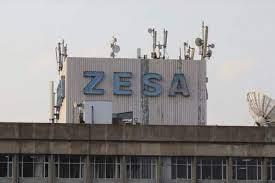News / National
Zesa rebundling begins
29 Jun 2025 at 10:21hrs |
0 Views

Mutapa Investment Fund (MIF) has initiated the process of rebundling ZESA Holdings, aiming to streamline operations, enhance efficiency, and reduce costs within Zimbabwe's struggling electricity sector, MIF CEO Dr John Mangudya has confirmed.
ZESA (Zimbabwe Electricity Supply Authority) was unbundled nearly two decades ago into five subsidiaries: Zimbabwe Power Company (ZPC) for generation; Zimbabwe Electricity Transmission and Distribution Company (ZETDC) for distribution; the Rural Electrification Agency; ZESA Enterprises (ZENT), which manufactures electrical equipment; and Powertel, an internet service provider owned by ZESA.
However, this fragmentation led to operational inefficiencies, duplication of boards, bloated administration, and increased bureaucracy, hampering the power sector's overall performance.
In 2019, consultancy firm Ernst & Young recommended rebundling ZESA's assets to address these challenges. Though these recommendations remained dormant for years, the government has now moved decisively to reverse the unbundling.
"The Government approved this consolidation about six years ago based on consultant recommendations, so this is not a new initiative," said Dr Mangudya. "We have commenced consolidation with a major focus on improving efficiency."
The Ernst & Young report also advised separating the roles of chairman and chief executive officer to enhance governance - a practice yet to be fully adopted, with Dr Sydney Gata currently serving as ZESA Holdings' executive chairperson.
MIF, entrusted with reforming key state enterprises, sees the rebundling as central to restoring ZESA's profitability and operational coherence.
Dr Mangudya warned that the process would be lengthy, requiring robust frameworks to tackle legacy issues such as debt management, creditor claims, and outstanding loans across subsidiaries.
Economic analysts have lauded the move as a crucial step toward reviving Zimbabwe's power utility.
"Rebundling is not merely cosmetic; it is a strategic imperative to restore a seamless operational chain from generation to distribution, which is essential for efficiency and reliable power supply," said economist Carlos Tadya.
He highlighted that the previous fragmented structure inflated operational costs due to multiple boards and redundant overheads. "Consolidating under one umbrella is expected to yield significant savings through economies of scale, lower overheads, and streamlined procurement."
Another analyst, Gerald Musara, noted that the unbundled ZESA had grown unsustainably large, with excessive staff numbers driving up the cost of power production per worker, undermining financial viability.
"This rebundling presents an opportunity to right-size the workforce and optimize resource allocation to enhance service delivery," Musara added.
As Zimbabwe continues to grapple with power supply challenges, the rebundling of ZESA represents a critical reform aimed at creating a more efficient, financially sustainable electricity sector - a vital component of the country's broader economic recovery.
ZESA (Zimbabwe Electricity Supply Authority) was unbundled nearly two decades ago into five subsidiaries: Zimbabwe Power Company (ZPC) for generation; Zimbabwe Electricity Transmission and Distribution Company (ZETDC) for distribution; the Rural Electrification Agency; ZESA Enterprises (ZENT), which manufactures electrical equipment; and Powertel, an internet service provider owned by ZESA.
However, this fragmentation led to operational inefficiencies, duplication of boards, bloated administration, and increased bureaucracy, hampering the power sector's overall performance.
In 2019, consultancy firm Ernst & Young recommended rebundling ZESA's assets to address these challenges. Though these recommendations remained dormant for years, the government has now moved decisively to reverse the unbundling.
"The Government approved this consolidation about six years ago based on consultant recommendations, so this is not a new initiative," said Dr Mangudya. "We have commenced consolidation with a major focus on improving efficiency."
The Ernst & Young report also advised separating the roles of chairman and chief executive officer to enhance governance - a practice yet to be fully adopted, with Dr Sydney Gata currently serving as ZESA Holdings' executive chairperson.
MIF, entrusted with reforming key state enterprises, sees the rebundling as central to restoring ZESA's profitability and operational coherence.
Economic analysts have lauded the move as a crucial step toward reviving Zimbabwe's power utility.
"Rebundling is not merely cosmetic; it is a strategic imperative to restore a seamless operational chain from generation to distribution, which is essential for efficiency and reliable power supply," said economist Carlos Tadya.
He highlighted that the previous fragmented structure inflated operational costs due to multiple boards and redundant overheads. "Consolidating under one umbrella is expected to yield significant savings through economies of scale, lower overheads, and streamlined procurement."
Another analyst, Gerald Musara, noted that the unbundled ZESA had grown unsustainably large, with excessive staff numbers driving up the cost of power production per worker, undermining financial viability.
"This rebundling presents an opportunity to right-size the workforce and optimize resource allocation to enhance service delivery," Musara added.
As Zimbabwe continues to grapple with power supply challenges, the rebundling of ZESA represents a critical reform aimed at creating a more efficient, financially sustainable electricity sector - a vital component of the country's broader economic recovery.
Source - Sunday Mail
Join the discussion
Loading comments…


































